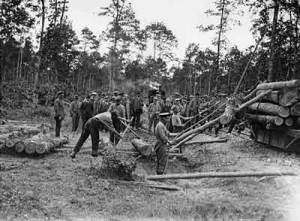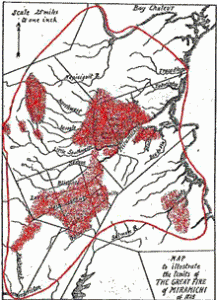
Canadian Forestry Corps in France
unloading timber during World War I.
Source: National Library of Scotland
During the First World War thousands of foresters left the logging camps of British Columbia and other parts of Canada to serve in the Canadian Forestry Corps in Europe. The Forestry Corps was set up to help European allies producing sufficient amounts of timber from their forests for the war effort. In Europe, these Canadian foresters were confronted with intensive forest management practices, unknown to them back home.
After the War the British and other European governments appealed to Canada for tree seed to replant the devastated European forests. To meet this demand the British Columbia provincial government established a system for fir cone harvesting, seed extraction and overseas shipment. Although this was deemed appropriate for forests in Europe, the hand planting of tree seedlings was considered neither economically feasible, nor desirable as a method of forest regeneration in Canada. In this podcast episode David Brownstein of the University of British Columbia explains how the coincidence of the exposure of Canadian foresters to European forestry management practice and the post-war seed collection were to transform Canadian forestry, leading to the abandonment of the policy of natural regeneration.
Website mentioned
AAC2010: Environments
Music credit
“The Way” by Pitx
Available from ccMixter

Recent Comments